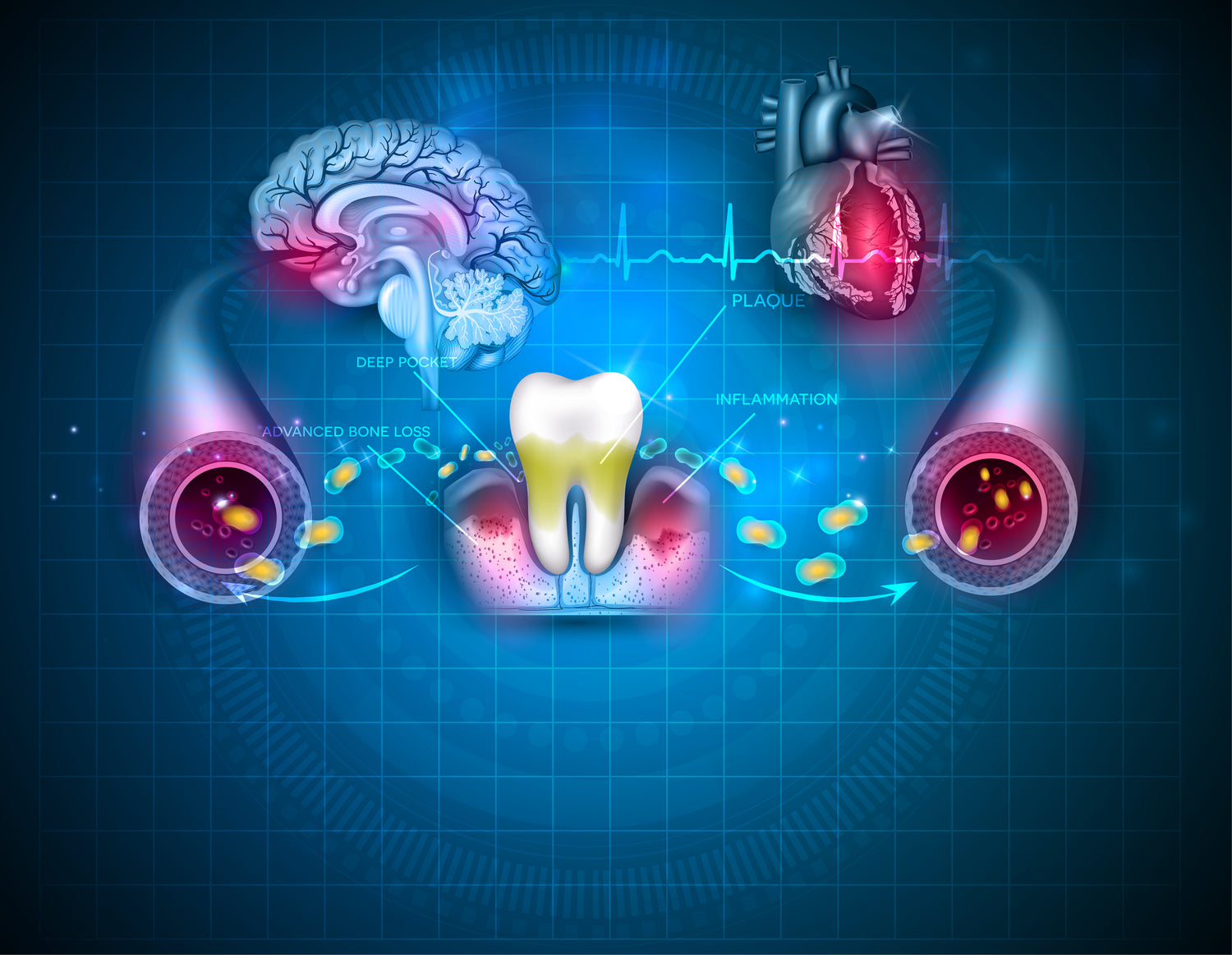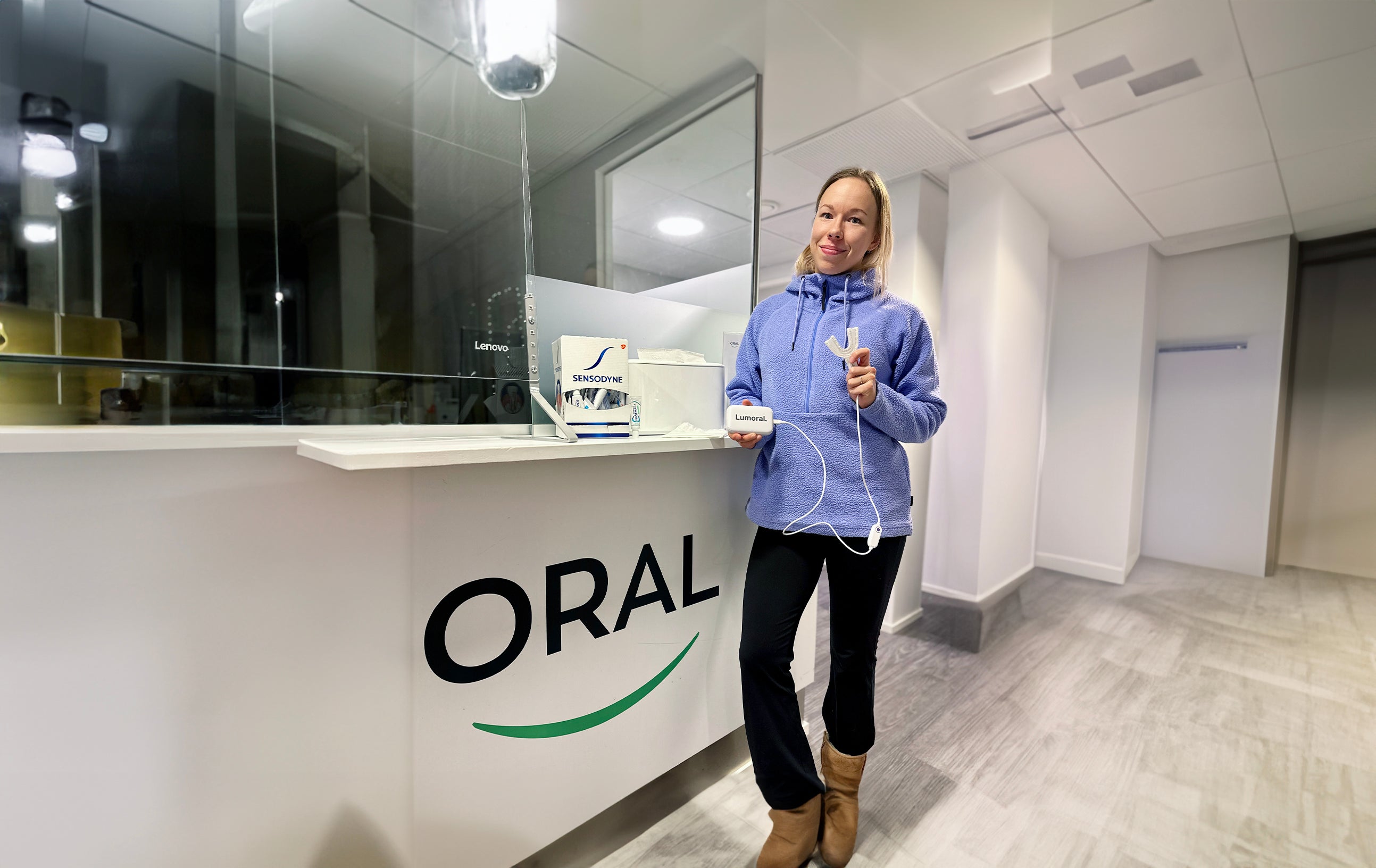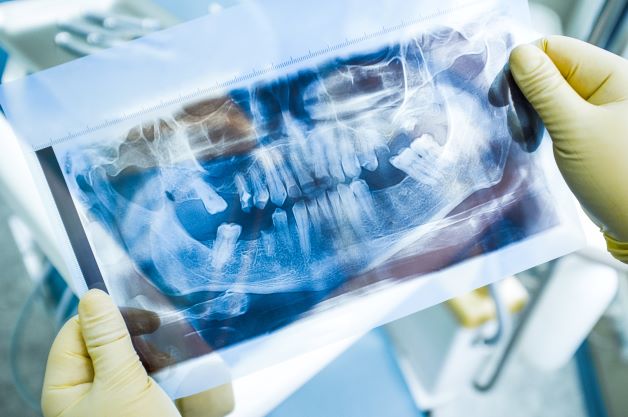Good oral hygiene is an essential part of the basic management of kidney and liver disease. For transplant patients, oral health care is particularly important as these patients are often at increased risk of oral infections and their complications.
The health of the kidneys and liver is closely linked to the well-being of the whole body, and oral health also affects the functioning of these organs. Poor oral health can increase the body's risk of inflammation and reduce overall immunity. This in turn can negatively affect the management of kidney and liver diseases (1).
- Kidney and liver diseases and their treatments are often associated with a weakening of the body's defence mechanisms, which can make any infection dangerous. This is especially true if patients are prescribed immunosuppressive medication, as is always the case after transplantation, says Jukka Meurman, Professor Emeritus, Department of Oral and Maxillofacial Diseases, Helsinki University Hospital.
Inflamed gums provide a direct route for bacteria in the mouth to enter the rest of the body.
- From the mouth and teeth, bacteria can easily enter the bloodstream through gingivitis, periodontitis, caries cavities, and mucosal ulcers. Infections of the mouth are harmful because they result in a low-grade inflammatory condition, at worst involving the whole body, Meurman continues.
Oral infections are particularly harmful for chronically ill people - including diabetics, people with rheumatic and kidney diseases, and patients on immunosuppressive medication, or with defence system disorders. Recent research suggests that dental infections may even increase the risk of cancer (2, 3)
- This is also explained by chronic inflammation, says Meurman.
Preventing the risk of bacteraemia
The risk of bacteraemia is increased in people with long-term conditions. Bacteraemia is an infection caused by bacteria, which occurs when bacteria that have entered the bloodstream trigger the body's defence response against them. In the worst cases, it can trigger damage to one or more organs. This is called sepsis. (4)
Bacteria can enter the bloodstream from inflamed areas of the oral cavity. This can happen during tooth brushing, flossing, or dental procedures. In most cases, bacteraemia is short-lived, and the body can fight it off. However, if a person has a weakened immune system or if bacteraemia recurs frequently, it can cause problems.
- In chronically ill patients, every effort should be made to prevent bacteraemia. Oral health is crucial, as the mouth is the most common source of normal bacterial growth in the body. Mucous membranes, teeth, and gums must be kept in healthy condition through daily effective oral hygiene maintenance, says Meurman.
Studies have shown that in patients at risk of heart disease, bacteraemia caused by dental procedures is even one of the causes of bacterial endocarditis. Bacterial endocarditis is an infection that affects the endocardium, the inner membrane of the heart, and can be particularly serious in people with compromised immunity. This infection can damage the heart valves and requires immediate treatment (5).
Aiming for an infection-free mouth
At the time of transplantation, the teeth and mouth must be healthy and free of infection. Oral health also has an impact on recovery from surgery. Meurman points out that transplant patients are at risk of infection for the rest of their lives, so it is essential that they strive to maintain good oral hygiene every day.
- All available methods should be put in place well in advance of any surgery.
Oral infections and the resulting distant infections can be fatal for surgical and chronically ill patients.
- All oral and dental infections should be diagnosed and treated before transplant surgery. This often involves extraction of infected teeth with poor prognosis. For example, those with deep cavities or deep periodontal pockets need to be removed.
However, radical solutions are not always necessary before surgery. A transplant patient's treatment plan is individual and influenced by the patient's own motivation to maintain good oral health. On the other hand, if the transplant is not planned for many years, more tooth-preserving and restorative treatments are possible. In this case, tooth extractions can be avoided.
- The basic idea is, of course, that the mouth and teeth should have been always kept in good condition by careful and regular oral hygiene practices, rather than reacting only when there is a need for radical treatments, says Meurman.
Deep gum pockets are nests of bacteria
In addition to health and general well-being, maintaining good oral health also affects the patient's quality of life. A painful mouth, dental problems and other oral health issues can reduce a patient's quality of life and increase stress, which in turn can have a negative impact on health in general and the outcome of treatment for an underlying disease, says Meurman.
Regular dental check-ups and careful oral hygiene practices are an important part of comprehensive health care for people with kidney and liver diseases.
Taking care of oral health and working closely with dental professionals is particularly important for patients taking immunosuppressive drugs, which increase the risk of oral infections such as gingivitis and periodontitis. This is because these drugs weaken the immune system's ability to fight bacteria in the mouth.
Immunosuppressive medicines can also cause changes to the mucous membranes, such as mouth ulcers and dryness (xerostomia), which increases the risk of caries.
Periodontal disease – a persistent companion once it breaks out
Signs of periodontal disease include reddened and bleeding gums and bad breath. In people with periodontal disease, the fibres that attach to the tooth are destroyed. A pocket begins to form between the gum and the tooth, which can extend around the entire tooth. Gradually, the inflammation begins to destroy more of the tissues that attach the teeth and eventually spread in the jawbone.
Once established, periodontitis is a tenacious companion that will progress if not treated carefully. Daily oral home care plays an important role in periodontitis and oral health in general.
- Regular dental check-ups, daily brushing and cleaning of the interdental spaces and maintaining the oral moisture balance are important measures to maintain oral health.
However, traditional oral hygiene methods are not always enough to keep the mouth healthy. For example, flossing or brushing may be difficult due to age, thus leaving the spaces between the teeth uncleaned. On the other hand, even if brushing the teeth is successful, studies have shown that even an effective electric toothbrush only removes about 65% of the harmful bacteria in the mouth. (6)
To tackle this residual plaque, which is invisible to the naked eye, Finnish researchers have developed an antibacterial oral health enhancing device that is based on antibacterial photodynamic therapy. This method effectively eliminates both the bacteria responsible for tooth decay and those contributing to gingivitis. The Finnish Association of Oral Hygienists has endorsed the use of the Lumoral device (7).
- Home-administered antibacterial photodynamic therapy is a new method that helps improve oral health and has been proven to be effective in scientific studies. It does not replace other oral hygiene methods such as tooth brushing and flossing but complements them perfectly. For liver, kidney, and organ transplant patients, if any, use of the new method is highly recommended, says Meurman.
The oral health enhancing device is used in addition to regular brushing. Plaque, which is made up of living bacterial cells, is normally sticky and is difficult to remove completely from the surfaces of the teeth with a brush alone. After using the device, the existing plaque becomes easier to remove by brushing (8).
- Home-administered antibacterial photodynamic therapy is suitable for everyone but is particularly important for those with tooth decay or gingivitis.

Prof Jukka Meurman is an eminent figure in the field of oral infectious diseases. Presently, he holds the title of Professor Emeritus at the University of Helsinki, and serves as the Head Physician at the Department of Oral and Maxillofacial Diseases at Helsinki University Hospital, Finland. His contributions have earned him numerous prestigious honors and accolades.
Sources:
- Åberg F, Helenius-Hietala J. Oral Health and Liver Disease: Bidirectional Associations-A Narrative Review. Dent J (Basel). 2022 Jan 21;10(2):16. doi: 10.3390/dj10020016. PMID: 35200242; PMCID: PMC8870998..
- Nieminen, M., Listyarifah, D., Hagström, J. et al. Treponema denticola chymotrypsin-like proteinase may contribute to orodigestive carcinogenesis through immunomodulation. Br J Cancer 118, 428–434 (2018). https://doi.org/10.1038/bjc.2017.409
- Heikkilä, P., But, A., Sorsa, T. and Haukka, J. (2018), Periodontitis and cancer mortality: Register-based cohort study of 68,273 adults in 10-year follow-up. Int. J. Cancer, 142: 2244-2253. https://doi.org/10.1002/ijc.31254
- https://www.epressi.com/tiedotteet/terveys/suun-infektiopesakkeet-voivat-vaarantaa-syopa-tai-leikkauspotilaan-hoidon.html
- Poveda-Roda R, Jiménez Y, Carbonell E, Gavaldá C, Margaix-Muñoz MM, Sarrión-Pérez G. Bacteremia originating in the oral cavity. A review. Med Oral Patol Oral Cir Bucal. 2008 Jun 1;13(6):E355-62. PMID: 18521055.
- Aggarwal N, Gupta S, Grover R, Sadana G, Bansal K. Plaque removal efficacy of different toothbrushes: a comparative study. Int J Clin Pediatr Dent. 2019;12(5):385-390. doi:10.5005/jp-journals-10005-1669
- The Finnish Oral Hygiene Association recommends Lumoral. Finnish Association of Dental Hygienists. September 1, 2022. https://www.suuhygienistiliitto.fi/suomen-suuhygienistiliitto-suosittelee-lumoralia/
- Pakarinen, Saila, et al. "Home-Applied Dual-Light Photodynamic Therapy in the Treatment of Stable Chronic Periodontitis (HOPE-CP)—Three-Month Interim Results." Dentistry Journal 10.11 (2022): 206.



Leave a comment
This site is protected by hCaptcha and the hCaptcha Privacy Policy and Terms of Service apply.